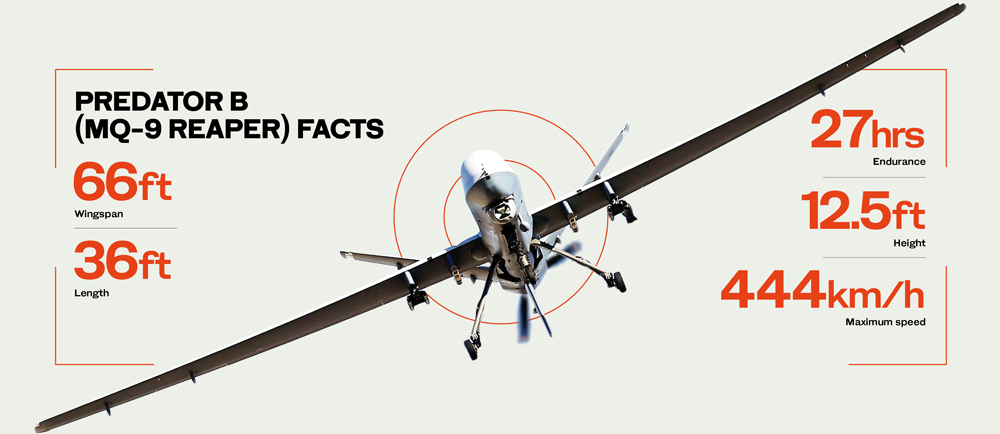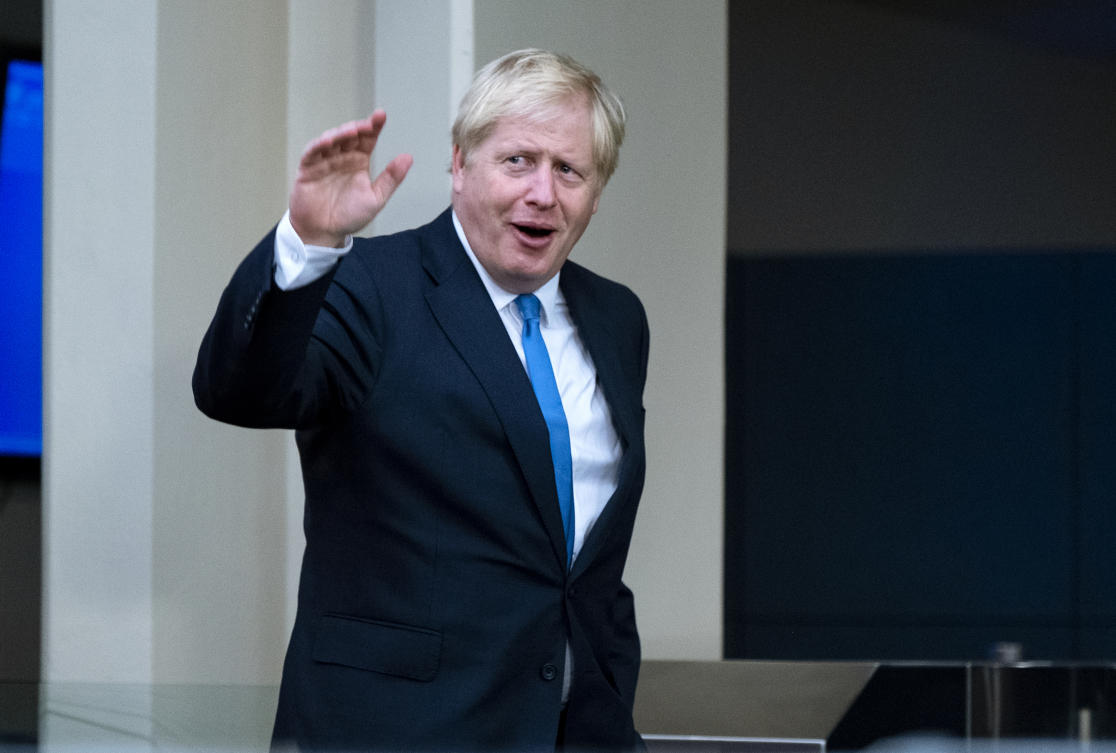Combat drones usher in era of ‘war by remote’
ABU DHABI: It is a new chapter in Middle East warfare. Experts say “war by remote” is a growing trend in the region. And most countries are insufficiently prepared to deal with the growing security challenge posed by high-tech, remote-controlled unmanned aerial vehicles (UAVs) or combat drones.
A combination of widespread availability, increasing technological sophistication and falling costs of drones is injecting a new dose of geopolitical uncertainty into the Middle East and North Africa.
Bigger armies with more lethal weaponry are finding themselves increasingly vulnerable as weaponized drones turn into a critical element of asymmetric warfare.
Michael Knights, a senior fellow at the Washington Institute, has been following warfare in the Middle East for the last 20 years.
According to him, the region is now “seeing players from all sides using drones — whether they are a very small group such as (Daesh) terrorists or a group with Iranian support” such as Yemen’s Houthi militias, who have claimed responsibility for repeated attacks on Saudi civilian infrastructure.
The Houthis have claimed responsibility for the Sept. 14 attacks on the Saudi Aramco oil-processing facilities in Abqaiq and Khurais, which caused damage that halved the crude output of the world’s top oil exporter. However, a US official has said the strike originated from southwestern Iran.
FASTFACT
60% – Israel’s estimated share of global unarmed UAVs market
Saudi Arabia has said 18 drones, along with seven missiles, were used in the attacks. Iran has denied any involvement, but it is widely suspected of having armed its regional proxies, notably the Houthis, Hezbollah in Lebanon, and Shia paramilitary groups in Iraq, with combat drones.
UAV refers to all types of small and mid-sized devices with no pilot in them. They can be controlled remotely by a ground-based pilot or can fly following a pre-defined flight plan.
Advanced drone models use GPS signals from satellites to connect as well as communicate their location to the pilot.
A UAV can be used for anything from simple photography, to surveillance, to carrying payloads including explosives and missiles.
The Reaper model, for instance, can carry more than 1.5 tons of ordnance and can be operated from by a ground-based pilot stationed hundreds of miles away.
The threat has been growing over the years, says Knights. “Almost everywhere you look nowadays, drones are being used for surveillance or for crashing into targets, drones that have explosives on them, or drones — the most recent versions — that drop bombs and are reusable.”
The Houthi militias have been using UAVs in combat since the start of the Yemen war. They first appeared to be elementary, off-the-shelf models, but later ones have been nearly identical to Iranian-designed UAVs.
Targets have included the holy city of Makkah, airports, royal residences, oilfields and pipelines, oil installations and desalination plants.

UN investigators have suggested that the Houthis’ new UAV-X drone may have a range of up to 1,500 kilometers, which means they would be able to reach Saudi Arabia and the UAE from Yemen.
In mid-May this year, drone warfare grabbed the headlines when oil tankers and pipelines were targeted by remote-controlled bombs that forced Saudi Aramco briefly to suspend pipeline operations.
The UN said the Houthis were using small and medium-sized UAVs for reconnaissance, surveillance and attacks.
Incidentally, the country that was the first to create a national drone program in its military was Israel.
Companies such as Elbit Systems, Israel Aerospace Industries, Rafael, UVision and Aeronautics have been developing new technologies for both waging drone warfare and countering UAV attacks.
For decades now, Israel has invested in drone technology as part of its defense-arsenal mix. The strategy has proven its usefulness for a highly security-conscious country with multiple borders.
Israel has used combat drones to track and strike targets far beyond its geographical borders instead of sending manned aircraft deep into enemy airspace.
“Israel has dozens of drones. Some drones have range as short as 10,000 miles. Others can travel from 20,000 miles to hundreds of thousands of miles,” Knights said.
Yossi Mekelberg, a professor of international relations at Regent’s University London, said the Middle East is “seeing more and more unmanned vehicles” on the battlefield.
“The thing is, drones are cheaper — you don’t risk pilots by using them as it’s all remote-controlled,” he told Arab News.
“It is high-tech, it is precise and, in many ways unfortunately, it will become the preferred option where possible.”
The most advanced users of drones by far are Iran and Iranian-backed groups such as the Houthis in Yemen.
Israel’s defense industry produces drones such as the Heron TP, which can fly more than 1,000 kilometers for 30 hours, to monitor threats from Hamas in the Gaza Strip and Hezbollah in Lebanon and Syria.
Drones such as the SkyStriker and Harpy, which are equipped with warheads and can launch precise long-range strikes, belong to the category known as “loitering munitions.”
The most advanced users of drones “by far are Iran and Iranian-backed groups such as the Houthi militias in Yemen,” said Knights.
As examples, he cites airborne drones and stealth amphibious drone boats, such as nine Houthi explosive boats designed to target international shipping off Yemen’s Red Sea coast that were destroyed by airstrikes carried out by the Saudi-led military coalition.
“A drone boat guides itself using an electrical eye,” he said. “I have been on one. You can hear it try and turn the rudder of a ship. So the Iranians have provided the Houthis with really advanced capabilities: Drones that can hit and destroy with great precision.”
In this context, Yemen has been a testing ground for Iran-backed forces. “Basically, it is like a battle laboratory where Iran can test out these new capabilities. That is what Yemen is to them,” Knights said.
According to Knights, drones have been in play for more than two decades — a lot longer than most people think.
“They were used in the Iran-Iraq War while the Americans used drones as far back as the Vietnam War,” he said. “But drone use is now really starting to accelerate.”
According to Knights, Daesh, while fighting wars in Iraq and Syria, was the first to start using drones “extensively … both for surveillance and bomb-dropping.”
The battle for Mosul — a huge military operation to recapture Iraq’s second-largest city from Daesh — was a “real turning point” in the use of drone warfare.
“This was when ISIS (Daesh) really upped the ante,” Knights said, adding that Daesh used helicopter drones to both “look around the neighborhood” and to spread fear.
Other militant groups have not been far behind. A UN Security Council report said the most commonly used UAV in the Houthi arsenal for “loitering munitions” was Qasef-1, which had a lot in common with the Iranian made Ababil-2/T UAV, which has been used in Yemen since 2016.
The UN investigators found that the new UAVs are characterized by distinctive V-shaped tail fins and a more powerful engine.
One of them, the Samad 2/3 UAV, carries a warhead with 18 kilograms of explosives mixed with ball bearings.
Hezbollah too is developing its drone technology. The Lebanese militia has been using combat drones based on Iranian designs since 2004, flying them into or near Israeli airspace.
Hezbollah is also said to have used drones in Syria to support the regime of President Bashar Assad.
Knights said all this is happening because drone technology is relatively simple. “As a result, particularly for small drones made of fiberglass and used by remote control and with nothing particularly complicated by it, anyone can pretty much operate them,” he said.

“What the Iranians have done is they have developed a good formula. You only send to Yemen, for example, the specific electronic program.
“Inside Yemen, there are drone-making workshops using stuff you can legally buy off the open market, such as fiberglass.
“Iranians have learned to go low-tech and this has allowed groups in Yemen to use drones. It might seem very high-tech but it’s actually quite low-tech.”
From all accounts, Knights says, Israel’s dominance in drone warfare is being challenged by Iran and its regional allies and proxies.
Experts say drones are useful in an important way: deniability. For example, Israel is widely suspected to have been the source of the drones that were deployed in Iraq and Lebanon in recent weeks, but the Israeli government saw no reason to own up.
“You don’t risk pilots in doing this,” said Knights, adding “you can deny you are behind any attack, which means it might sometimes be tempting for decision-makers to use it in their war and deny using it or to create battlefield ambiguity.”
None of this is to say weaponized drones do not have their downsides. Knights said that once detected, drones can be destroyed instantly.
“You can send a signal to blow itself up and zap it once it gets closer to its target,” he told Arab News.
“You can shoot it down using a number of weapons, from an expensive missile to guns, sniper rifles, or even guns that fire nets, and snare it.”
A drawback about a drone guided by GPS, according to Knights, is “you can know exactly where it started if it is still intact.”
He pointed to an incident of a drone boat captured by Saudi authorities. The GPS coordinates and images, released by the US, pointed the finger at the Islamic Revolutionary Guard Corps (IRGC) in Tehran.
“In the camera … you could see all the IRGC members bored in their lavatories, taking pictures of themselves. It was almost laughable,” said Knights.
“Drones, if captured intact, leave a digital footprint. Deniability is not perfect with these things.”
Additionally, as Mekelberg points out, drone warfare is not risk-free, citing the incident earlier this month when Hezbollah downed an Israeli unmanned aircraft outside a southern Lebanese town.
“It (drone use) brings a danger — when in Lebanon it didn’t go exactly to plan — it created tensions which could have led to a much bigger round of tensions between Hezbollah and Israel,” he said.
Furthermore, he says, with drones showing their growing value on the battlefield, more and more terror groups are turning to unmanned aircraft.
With the growing threat, Mekelberg said more countries need to step up their airspace security platform that detects, classifies, and mitigates all drone threats.
“Some countries have anti-drone systems, but drones are getting more advanced and sophisticated and lots of countries are not equipped to deal with it,” he said.
If recent developments are any guide, the world has yet to see the full capability of combat drones in the sprawling Middle East war theater.

Saudi Arabia’s Defense Ministry displays Iranian drones, cruise missiles used in Aramco attacksSuspected drones disrupt Dubai flights




